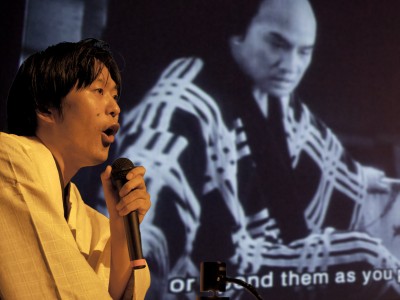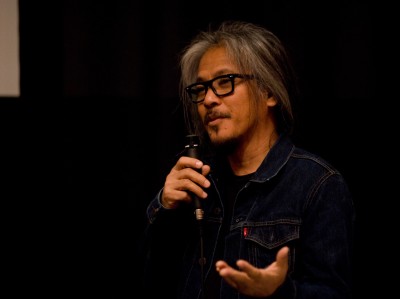
Listen to Britain and Blue introductions by Haden Guest and Max Carpenter.
Transcript
Haden Guest 0:01
Good evening, ladies and gentlemen. My name is Haden Guest, I'm Director of the Harvard Film Archive. I want to thank you all for being here tonight. This is the opening screening in a series dedicated to not one but to two filmmakers. It's called Poets of Pandaemonium. And it brings together the work of Derek Jarman and Humphrey Jennings, two filmmakers whose work is rarely considered in this fashion. And so it's a particularly exciting and provocative and, I think, important series.
Tonight’s screening of Blue and Listen To Britain, is being presented as part of our ongoing monthly series called Cinema of Resistance, which my late and very great colleague David Pendleton invented and it gives a space for films that ask us to think about what it means to resist, what it means for cinema to create an alternate space to speak out and to speak differently. And I think that's certainly true about both of these films. The earlier film from 1942, Listen to Britain, was, of course, made during the dark years of the Second World War. And it's a film about, among other things, resistance of fear, resistance that Londoners and the British had to endure and had to learn to live with. And then, of course, we have this sublime late masterpiece by the great Derek Jarman.
I'm not going to say more about these films, however, because tonight, we're really pleased to have with us the curator of the series. This is Max Carpenter, who is a freelance curator. And I first learned of this project because David Schwartz, who was formerly the head curator of the Museum of the Moving Image, told me. He said, “There’s this young curator who has this really fantastic idea, and I think you should consider it.” And he started to describe it. And I said, “Oh, yeah, absolutely!” And that's how it came to be that this series opens here at the Harvard Film Archive and then travels to the Museum of the Moving Image in Astoria, Queens, later next month. Take a look at our calendar, you'll see the different pairings that continue into February.
I’d like to ask everybody to please turn off any cell phones, any electronic devices that you have. Please refrain from using them during tonight's screening. And please, with no further ado, join me in welcoming Max Carpenter!
[APPLAUSE]
Max Carpenter 2:50
Thank you very much for having me, Haden, and definitely to the Harvard Film Archive in general. This series could not have been possible, of course, without David Schwartz, who just ended a, I think, 30-year tenure at the Museum of the Moving Image. So even though he's not here, I think he really deserves a round of applause, as well.
[APPLAUSE]
Really great guy, just doing so many great things in film for so many people. And thanks to MOMI and the BFI for so many great prints. I usually like to keep introductions short but I think this is one of the more strange programs I've had to introduce. So if I were in the audience, I'd want more of an explanation for why I'm seeing Listen to Britain, followed by Blue, which are two very different films. In this series, there are a lot of pairings of films by Derek and Humphrey, that are kind of shockingly similar. But this is one where they're quite different, I think. But for me, these films are both of the directors showing us their worlds. And what I mean by that is, Humphrey Jennings, this world of oppression, in the midst of World War Two, he's really letting us live, ethnographically, in the space of crowds of people gathering despite the war. And for him, that was really a beautiful thing and what he saw as his world. For Derek, sadly on his deathbed, dying of AIDS, he made one of the most incredible films I've ever seen in my life. But it's very different. It's a bit of a fever dream. And it's quite a collaborative project, with composer Simon Fisher-Turner and bands like Coil. So, for me, the way that these films relate to each other is not only that these directors’ separate worlds are their own. But I like to envision this as sort of a time travel series, in that these directors, who are occupied with very similar ideas, come to make very different films because of their eras. And I think what you see over the 20th century is a movement from a certain optimistic crowd consciousness against fascism, into a more pessimistic, atomized, individualized society. And I don't think you could paint that picture any better than putting these two films right next to each other. But the other obvious thing that is in the program notes is, they're both extremely sound-oriented films. Blue to the point of just having a blue image as the entirety of the visual component of the film. And I think the best way that I understand what these directors understood about sound is something that film scholar Rick Altman talked about, which is that a lot of people—probably as a carryover from the silent era—think of sound as an accompaniment to the image, sort of the image is the master in film, and the sound is its sidekick. But in truth, the way that people experience film with sound is more that the image is kind of like a hand puppet. And the sound is the master ventriloquist. And I think both of these filmmakers, during times when, I mean, I don't think anyone really thinks of sound like that except sound designers. But these filmmakers did, and it's quite remarkable. But I think I'm probably saying a bit too much already. So thank you very much.
[APPLAUSE]
©Harvard Film Archive
Related film series
Explore more conversations
Kataoka Ichiro

Lav Diaz

Nace Zavrl


